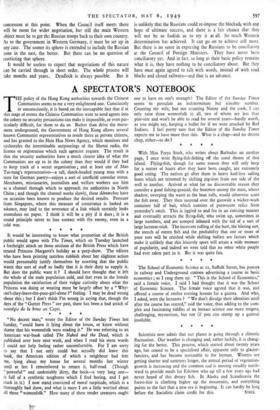A SPECTATOR 'S NOTEBOOK
THE policy of the Hong Kong authorities towards the Chinese Communists seems to me a very enlightened one. Consciously or unconsciously, it is based on the inescapable fact that if at this stage of events the Chinese Communists want to send agents into the colony no security precautions can make it impossible, or even par- ticularly difficult, for them to du so. Rather than drive the move- ment underground, the Government of Hong Kong allows several known Communist representatives to reside there as private citizens, and has granted to the Hsin Hua News Agency, which monitors and cyclostyles the interminable outpourings of the Shensi radio, the licence or registration which such agencies require. The result is that the security authorities have a much clearer idea of what the Communists are up to in the colony than they would if they had to keep track of a secret organisation ; and at least one of Mao Tse-tung's representatives—a tall, shock-headed young man with a taste for German poetry—enjoys a sort of unofficial consular status. Merchants, missionaries, journalists and welfare workers use him as a channel through which to approach the authorities in North China ; and though the channel works slowly, these demarches have on occasion been known to produce the desired results. Pressure from Singapore, where this measure of connivance is looked on askance, may lead to the severance of a link which certainly looks anomalous on paper. I think it will be a pity if it does ; it is a sound principle never to lose contact with the enemy, even in a cold war.
* * * *






































 Previous page
Previous page